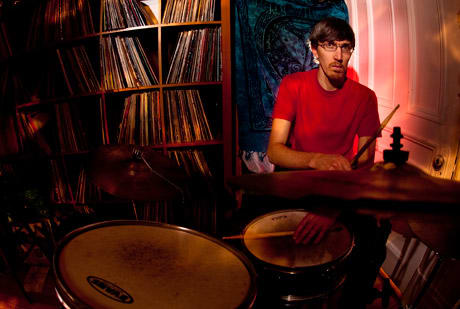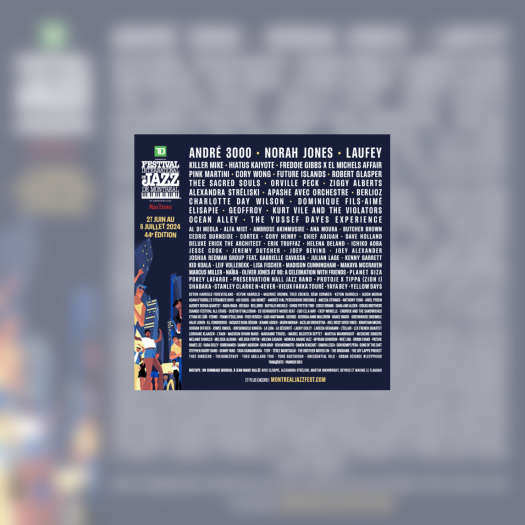Although only 32 years old now, breaks enthusiasts would be forgiven for thinking Kevin Moon, who records as Moonstarr, is much older than that. "I started buying records when I was 14," he enthuses at his current studio in Montreal's Mile End district. "I remember the first record I bought was Digital Underground's 'Do What You Like.' I'm looking at the record now, and it came out in 1989. Sometimes it amazes me how early I started."
It wasn't long after buying that first record that he got hooked on the idea of going further with his obsession for breakbeats - music composed out of looped drum samples. "I'm a drummer at heart, but technically my skills aren't proficient enough because I was never that kid-drummer guy. So I ended up searching for drums through other things, like samplers, drum machines, breaks on records."
That love of drums is well into its second decade now, and Kevin Moon is no longer the Toronto upstart. Rather he's a veteran who tours extensively around the world, manages a label, and has remixed everyone from Ennio Morricone to Ivana Santilli. These days, he's getting ready to drop his second album, Instrumentals Forever.
Instrumentals Forever is textbook Moonstarr, a 17-track journey through the dusty grooves of obscure drum samples brought back to life through a consistently warm and understated sense of eclecticism. Back in the mid-'90s, when he first got started as Moonstarr, the breaks scene wasn't as fragmented as it is now, and looped drums were still considered a meeting place between hip-hop, drum & bass, and house music. Moon's records still adhere to that ideal of breaks culture.
"Your breaks make you unique as a producer," he says, "especially when the records themselves are impossible to find. Finding a break on a record is rare, especially an unknown break."
As a result of that premium of obscurity, breaks culture also thrives as a community of collectors, and Moonstarr often relies on friends to dig through vinyl in search of breaks he can put to good use. "I've lucked out a lot because I've gotten a lot of breaks from my friends. I know a lot of diggers and we trade breaks back and forth. When you're digging for vinyl, you're always taking chances."
That's where a typical Moonstarr track gets started, by taking chances and cutting samples. The key to working with breaks is the availability of a good sampler, and a look through Moon's studio reveals a treasure trove of sampling tools from the last 15 years. The signature of a breaks track comes from what you put on top of it. For Moonstarr, that signature often comes from old bossa nova records.
"I found some records in the garbage once," he recalls. "It was pretty early on, when I was 15, 16. A lot of them were jazz, bossa records in the American style, you know, Astrud Gilberto, Stan Getz. When I started to hear it happening in hip-hop production, it blew my mind. It's uplifting music, but still sad and full of sorrow at the same time."
This jazzy perspective is arguably what makes Instrumentals Forever more emotive than your average future-jazz producer. Moonstarr likes to keep the vibe positive, and so the breaks and bossa nova samples are occasionally taken up a notch by some of the vocalists he works with on his label, Public Transit Records, names like LAL, Fineprint, Sarah Linhares, and Lotus who will already be familiar to fans of the homegrown urban scene.
The story of Public Transit Records runs part and parcel with the development of Moonstarr's sound. PTR began growing as offshoots of a college-radio mailing list. "I met a bunch of people through Paul E. Lopes' show in Toronto," Moon explains. "He did a show called Vibes N' Stuff on Thursday nights. He used to do this thing on his show where he'd invite listeners to send in an email or call to get added to his Jazzheads list. It was basically a hundred people, and I met a couple people through that email list, because people started using it to talk about common music. One of the guys I met on there was Mano, who helped start PTR. There were a couple of other people on there who began helping us throw house parties at our place at Spadina and College."
"At around that time, I began thinking about releasing my stuff professionally. I put out a CD called Code 416. The first party we had outside our house was actually a release party for the CD."
And he hasn't really stopped since, with the exception of a significant move. These days, the former Torontonian lives in Montreal, where he lights up parties for local DJ crews such as the Goods and Gumbo while holding down a day job as a technician at Concordia University. It's a laidback life, one that's about to be shifted into high gear with the release of the new album and the touring that entails. Typically, Moonstarr is already thinking ahead to the next album, and to do that he's already looking back to the wealth of vinyl that looms equally over his studio and over his inspiration.
It wasn't long after buying that first record that he got hooked on the idea of going further with his obsession for breakbeats - music composed out of looped drum samples. "I'm a drummer at heart, but technically my skills aren't proficient enough because I was never that kid-drummer guy. So I ended up searching for drums through other things, like samplers, drum machines, breaks on records."
That love of drums is well into its second decade now, and Kevin Moon is no longer the Toronto upstart. Rather he's a veteran who tours extensively around the world, manages a label, and has remixed everyone from Ennio Morricone to Ivana Santilli. These days, he's getting ready to drop his second album, Instrumentals Forever.
Instrumentals Forever is textbook Moonstarr, a 17-track journey through the dusty grooves of obscure drum samples brought back to life through a consistently warm and understated sense of eclecticism. Back in the mid-'90s, when he first got started as Moonstarr, the breaks scene wasn't as fragmented as it is now, and looped drums were still considered a meeting place between hip-hop, drum & bass, and house music. Moon's records still adhere to that ideal of breaks culture.
"Your breaks make you unique as a producer," he says, "especially when the records themselves are impossible to find. Finding a break on a record is rare, especially an unknown break."
As a result of that premium of obscurity, breaks culture also thrives as a community of collectors, and Moonstarr often relies on friends to dig through vinyl in search of breaks he can put to good use. "I've lucked out a lot because I've gotten a lot of breaks from my friends. I know a lot of diggers and we trade breaks back and forth. When you're digging for vinyl, you're always taking chances."
That's where a typical Moonstarr track gets started, by taking chances and cutting samples. The key to working with breaks is the availability of a good sampler, and a look through Moon's studio reveals a treasure trove of sampling tools from the last 15 years. The signature of a breaks track comes from what you put on top of it. For Moonstarr, that signature often comes from old bossa nova records.
"I found some records in the garbage once," he recalls. "It was pretty early on, when I was 15, 16. A lot of them were jazz, bossa records in the American style, you know, Astrud Gilberto, Stan Getz. When I started to hear it happening in hip-hop production, it blew my mind. It's uplifting music, but still sad and full of sorrow at the same time."
This jazzy perspective is arguably what makes Instrumentals Forever more emotive than your average future-jazz producer. Moonstarr likes to keep the vibe positive, and so the breaks and bossa nova samples are occasionally taken up a notch by some of the vocalists he works with on his label, Public Transit Records, names like LAL, Fineprint, Sarah Linhares, and Lotus who will already be familiar to fans of the homegrown urban scene.
The story of Public Transit Records runs part and parcel with the development of Moonstarr's sound. PTR began growing as offshoots of a college-radio mailing list. "I met a bunch of people through Paul E. Lopes' show in Toronto," Moon explains. "He did a show called Vibes N' Stuff on Thursday nights. He used to do this thing on his show where he'd invite listeners to send in an email or call to get added to his Jazzheads list. It was basically a hundred people, and I met a couple people through that email list, because people started using it to talk about common music. One of the guys I met on there was Mano, who helped start PTR. There were a couple of other people on there who began helping us throw house parties at our place at Spadina and College."
"At around that time, I began thinking about releasing my stuff professionally. I put out a CD called Code 416. The first party we had outside our house was actually a release party for the CD."
And he hasn't really stopped since, with the exception of a significant move. These days, the former Torontonian lives in Montreal, where he lights up parties for local DJ crews such as the Goods and Gumbo while holding down a day job as a technician at Concordia University. It's a laidback life, one that's about to be shifted into high gear with the release of the new album and the touring that entails. Typically, Moonstarr is already thinking ahead to the next album, and to do that he's already looking back to the wealth of vinyl that looms equally over his studio and over his inspiration.




